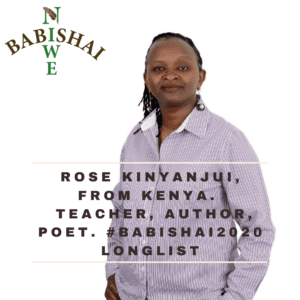ADIPO SIDANG FROM KENYA; AUTHOR, POET, PLAYWRIGHT, AND MORE
First, really excited about making it to the long-list. I’m an award-winning author, poet, playwright, culture exponent and governance consultant. I’ve got two books to my name – a collection of poems titled Parliament of Owls published by Native Intelligence under the Contact Zone Series with Goethe Institut (2016), and the 2017 Burt Award winning novella “A Boy Named Koko” published by Longhorn Publishers (2017).
I write for fun, for money, but I also write to cause fury and make us angry with ourselves and the world around us, so that we can change it. Writing is my form of advocacy. I tend to see myself as a gadfly that goads the steed of society out of slumber (to quote Socrates). I think that’s what every artist should consider themselves to be, or should at least strive to become.
Why were you inclined to submit for the #Babishai2020 haiku award?
I love haikus – the form, the invisible force that lingers on despite the brevity of haikus. It’s a way of saying poetry can be short and sweet without necessarily being caged in rhyme.
What was your process in writing this particular haiku below?
ringed with its papers
and tracked like jailbird on bail
the immigrant lands…
I don’t really think about this poetry like that; but I can say my process was chaos, anarchy, mental stampede, ideas colliding, moments of silence, questioning, doubts, literary pangs of pain, and the birth of a 5-7-5 haiku; all in under 3 minutes. I remember writing the third line first and the poem fell in place, in reverse. The poem was triggered by the arrival of a migratory Osprey bird in Kenya that flew over 6,000 kilometers from Finland. The interesting thing is that it had a reference ring on its leg; and it got me thinking about the fate of migratory birds, and that of immigrants, what freedom to them looks beyond the borders that chain them, and the illusion of freedom. The bird died a few days later.
In your opinion, what is the future of African haiku?
Well, hard to tell but it definitely looks promising; poetry in general is increasingly becoming more appreciated in Africa and the world. For a long time, poetry has been confined to the lowest rung of the literary ladder. It’s changing – shrubs are becoming trees, and trees – a forest; and haikus are somewhere in this fecund literary forest.
How are we able to share about this haiku experience, with Kenya, and the world?
The BN experience? It’s been great. Well, I’ve never been long-listed for writing a three line 17 syllable poem; if it happens – like in this case, it means there is some truth that won’t go away, that makes a reader question or wonder. Besides that, being long listed alongside other poets means there is something that is both common to us and to the literary community. I cherish this experience because you hardly come by it; I mean poetry awards in this part of the world are few, not to mention poetry awards for haikus.
….

